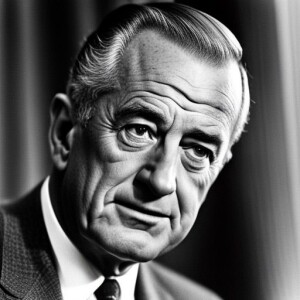Meet Lyndon Baines Johnson, the 36th President of the United States, famously known as LBJ. Born in the heart of Texas in 1908, he grew up in a small agricultural community and worked as a teacher before pursuing his passion for politics. Johnson’s political career started as a member of the House of Representatives and he later served as a Senator before becoming Vice President under John F. Kennedy.
After JFK’s assassination in 1963, Johnson took on the mantle of the President and continued many of Kennedy’s policies. However, it was his bold domestic agenda, “The Great Society”, that set him apart. Johnson aimed to reduce poverty, provide education, and improve healthcare through a range of social welfare programs. His most notable accomplishments were the Civil Rights Act of 1964, which outlawed discrimination based on race, religion, sex, color, or national origin, and the Voting Rights Act of 1965, which removed barriers to voting for African Americans. He also launched the War on Poverty, which included initiatives like Head Start and Medicare.
Nevertheless, Johnson’s presidency was not without controversy. His escalation of the Vietnam War, which led to protests and divisions in the country, was met with criticism. He also faced backlash for his handling of civil unrest and the use of government surveillance and wiretapping. Despite these challenges, Johnson was an exceptional politician who succeeded in passing significant legislation and introduced important changes in American society.
Post-presidency, Johnson retired to his beloved ranch in Texas, where he continued to engage in politics and philanthropy until his passing in 1973. Despite a mixed legacy, LBJ will always be remembered as a transformative President who made remarkable strides in the fight for civil rights and the war on poverty.

